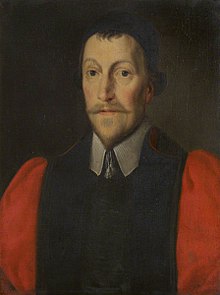Life
He was elected from Westminster School to a scholarship at Trinity College, Cambridge, in 1605, and proceeded B.A. in 1610. [2] He was chosen a fellow of Jesus College in the same university in 1611, commenced M.A. in 1613, and was appointed Archdeacon of Carmarthen in 1623, a post which he held until his death. [3] He was created D.D. in 1627. Beale became master of Jesus College on 14 July 1632, and on 20 February 1634 he was admitted Master of St John's College, Cambridge, a post which he retained until 1644. He was Vice Chancellor of Cambridge University from 1634 to 1635. [4] On 27 October 1637 he was presented by the king to the rectory of Paulerspury in Northamptonshire. He had also the rectory of Cottingham in the same county, Carlton, and Paulerspury. In 1639 he was presented to the sinecure rectory of Aberdaron. [5]
In the year 1642 Beale took an active part in urging the various colleges to send money and plate to the king at Nottingham. Oliver Cromwell, having failed to intercept the treasure in Huntingdonshire, proceeded to Cambridge with a large force. He surrounded St. John's College while its inmates were in the chapel, and took as prisoners Beale, Edward Martin, and Richard Sterne, Master of Jesus College. He brought them to the Tower of London. At this period Beale was deprived of his mastership and all his ecclesiastical preferments. From the Tower the prisoners were moved to Lord Petre's house in Aldersgate Street.
After a confinement of three years, Beale was released by exchange, and joined the king at Oxford. There he was incorporated D.D. in 1645, and in the following year he was nominated Dean of Ely, though he was never admitted to the dignity. He was one of the divines selected by the king to accompany him to Holdenby (1646). Ultimately he went into exile and accompanied the embassy of Lord Cottington and Sir Edward Hyde to Spain. His death occurred at Madrid on 1 October 1651.

William Sancroft was the 79th Archbishop of Canterbury, and was one of the Seven Bishops imprisoned in 1688 for seditious libel against King James II, over his opposition to the king's Declaration of Indulgence. Deprived of his office in 1690 for refusing to swear allegiance to William and Mary, he later enabled and supported the consecration of new nonjuring bishops leading to the nonjuring schism.

Richard Sterne was a Church of England priest, Archbishop of York from 1664 to 1683.

Francis Turner D.D. was Bishop of Ely, one of the seven bishops who petitioned against the Declaration of Indulgence and one of the nine bishops who refused to take the oath of allegiance to William III.

Joseph Beaumont was an English clergyman, academic and poet.
Samuel Collins (1576–1651) was an English clergyman and academic, Regius Professor of Divinity at Cambridge and Provost of King's College, Cambridge.

John May (Meye) was an English academic and churchman, who became Bishop of Carlisle. He also served the House of De Vere as cleric in Buckinghamshire.
Thomas Westfield was an English churchman, Bishop of Bristol and member of the Westminster Assembly.
Edmund Boldero (1608–1679) was an English royalist clergyman and academic, Master of Jesus College, Cambridge from 1663.

Robert Grove (1634–1696) was an English Bishop of Chichester.

William Stanley (1647–1731) was an English churchman and college head, Master of Corpus Christi College, Cambridge, Archdeacon of London and Dean of St Asaph.
Francis Dee was an English churchman and Bishop of Peterborough from 1634.

Robert Morgan was a Welsh Bishop of Bangor.

Samuel Hallifax or Halifax (1733–1790) was an English churchman and academic, holder of several chairs at Cambridge and was successively Bishop of Gloucester (1781–1789) and Bishop of St Asaph (1789–1790).
John Owen (1580–1651) was an English bishop of St Asaph.
Robert Boreman or Bourman D.D, was a Church of England clergyman who supported the Royalist cause in the English Civil War.
Richard Parr was an English bishop of Sodor and Man.
Jerome Beale was Master of Pembroke from 1619 to 1630; and Vice-Chancellor of the University of Cambridge in 1622 to 1623.
William Buckenham was a 16th-century priest and academic.
William Grigg, D.D. was Master of Clare College from 1713 until his death.
Lowther Yates, D.D. was a priest and academic in the second half of the 18th-century.
This page is based on this
Wikipedia article Text is available under the
CC BY-SA 4.0 license; additional terms may apply.
Images, videos and audio are available under their respective licenses.










